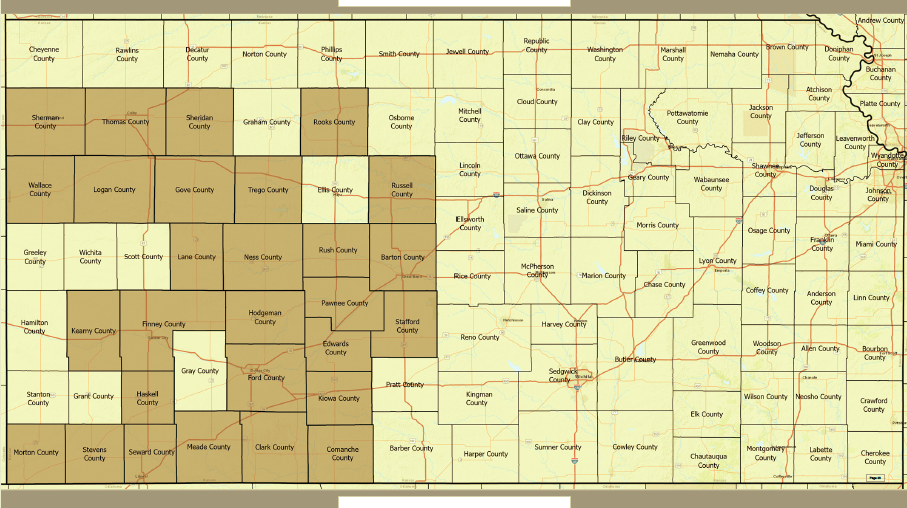By CRISTINA JANNEY
Hays Post
Representatives of the Kansas Natural Resource Coalition attended the Ellis County Commission meeting Monday and asked for the county to become members of the group.
The advocacy group is asking for $5,000 in annual membership dues.
In its request for funds from the county, the group said, "KNRC is a coalition of counties that monitors and, when appropriate, intervenes to reduce the impact of the federal government’s overreach when it impacts member counties in the area of natural resources and land use"
The group listed the following initiatives on which it seeks to rein in the federal government:
• 30x30 the America the Beautiful Initiative
• National Heritage Area
• Lesser prairie chicken designation as threatened
• Rails to Trails
• Great Western Trail
Duke Strobel, Russell County commissioner and coalition board member, said at the Ellis County Commission meeting Monday he is passionately against the 30X30 and trails initiatives.
"Organizations like this help us stay on top of things," he said of the coalition.
Tracey Barton, coalition executive director, also attended the county meeting and said the group formed in 2013 when the lesser prairie chicken was listed as threatened.
She said the coalition was responsible for getting that listing removed. The lesser prairie chicken is currently listed as vulnerable.
"We are basically using local government to put a check on higher government," she said.
Commissioners want more info
All three Ellis County commissioners said they wanted more information about the organization and its member benefits.
"I think that could be something that we could work in our budget for '23," Commissioner Neal Younger said.
Commission Chairman Butch Schlyer said, "It's something we could possibly research and look at the budget process."
Joe Leroux, commissioner, said, "It's not a crazy high cost, but I would want to know more about how's it benefiting the residents of Ellis County for us to be a part of this."
Schlyer said membership is something he definitely would like to consider when the commission starts looking at funding of its subsidized agencies.
"We may get that in the budget for next year," he said.
Land use policy
The 30X30 initiative is an executive order made by President Biden that seeks to designate 30 percent of the U.S. land and water as protected areas by 2030.
Conservatives have touted the 30X30 initiative and the National Heritage Area as a "land grab" by the federal government. The Biden administration has said the 30X30 program would work with landowners and be voluntary.
State Rep. Ken Rahjes, R-Agra, was the chairman of the Special Legislative Committee on the 30X30 initiative. He said the initiative is something Kansas legislators continue to watch, but he said he has not seen any movement on the legislation in the last three months and doubted there would be action prior to the mid-term election.
Kansas and Missouri already have a multi-county National Heritage Area that seeks to promote tourism to sites related to the Civil War. A push for an additional site in Nebraska and western Kansas was related to a group associated with the birthplace of Willa Cather.
Under the designation, land stays in private hands, but the area can receive federal dollars to promote tourism.
Rahjes noted the 30X30 and National Heritage Area designation are two different issues.
Rahjes said he opposes the designation of any western Kansas counties as part of a National Heritage Area. He said he thought more specifics need to be spelled out with stakeholders before the project could get off the ground.
He said he does not see any movement soon on that proposal either anytime in the near future.
"In Kansas, the one thing we want to protect is landowners' rights to utilize property ..." Rahjes said.
The Kansas Natural Resource Coalition testified before the 30X30 legislative committee, but Rahjes said he was otherwise unfamiliar with the group.
Trail, other legislation
Rails to Trails is a program that seeks to convert abandoned rail lines to public-access walking and biking trails.
The Great Western Trail is a corridor of braided and paralleling trails for both motorized and non-motorized users, its group website said. It currently does not include any trails in Kansas.
In addition to the issues listed above, the group on its website said it seeks to "protect human systems" from the following federal acts:
- National Environmental Policy Act
- Federal Land Management Policy Act
- Data Quality Act
- Rivers and Harbors Act
- Clean Water Act
- Migratory Bird Act
- Endangered Species Act
- Regulatory Flexibility Act
Twenty-nine counties, all in western Kansas, are current members of the coalition. See a map below.

Cover photo courtesy of Pixabay






